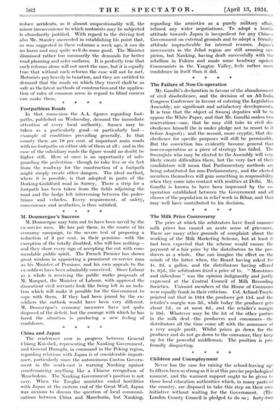The Road Safety Campaign It is significant that while there
were various criticisms of the Road Traffic Bill in the House of Commons on Tuesday, no one felt disposed to divide against the second reading. The fact is that the slaughter on the roads of the country is so appalling that no Member who values his seat would take the responsibility of opposing measures designed to increase the margin of safety. There will no doubt be amendments moved, and in some cases it may be hoped accepted, in Committee, for this is essentially the kind of measure in which efficient committee work is likely to be particularly valuable. But in the main the Bill has stood the test of general criticism well. There are, of course, objections to the imposition of any speed limit at all, but no one has been able to demon- strate that a reduction of speed to 80 miles an hour in built-up areas is any grave hardship, and if it serves to reduce accidents, as it almost unquestionably will, the minor inconvenience to which motorists may be subjected is abundantly justified. With regard to the driving test also Mr. Stanley .succeeded in establishing his point that, as was suggested in these columns a week ago, it can do no harm and may quite well do some good. The Minister dismissed rather too summarily the demands for better road planning and safer surfaces. It is perfectly true that such reforms alone will not meet the case, but it is equally true that without such reforms the case will not be met. Motorists pay heavily in taxation, and they are entitled to demand that the roads on which they travel shall be as safe as the latest methods of construction and the applica- tion of rules of common sense in regard to blind corners can make them.

















































